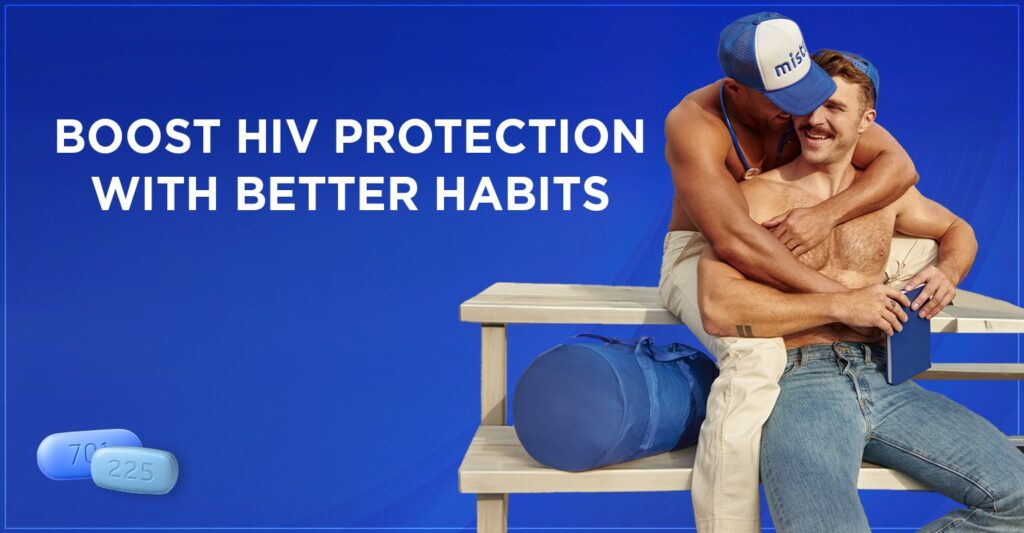HIV prevention isn’t just about taking medication or using condoms—it’s a holistic approach that encompasses various aspects of a healthy lifestyle. Your diet, exercise habits, and sexual practices all enhance the effectiveness of your prevention strategies. By making informed lifestyle choices, you can significantly reduce your risk of HIV and other sexually transmitted infections (STIs).
This article explores how adopting a healthy lifestyle supports HIV prevention and highlights how accessible resources, such as those offered by MISTR, can help you stay proactive about your health.
The Role of a Healthy Lifestyle in HIV Prevention
1. Diet and Immune System Support
A balanced diet rich in vitamins, minerals, and antioxidants is essential for a strong immune system. While PrEP (pre-exposure prophylaxis) is highly effective at preventing HIV, your overall health plays a significant role in maintaining its efficacy.
- Focus on foods like fruits, vegetables, lean proteins, and whole grains to support your body’s natural defenses.
- Stay hydrated and limit processed foods to reduce inflammation and promote overall well-being.
2. Exercise and Stress Management
Regular physical activity not only keeps your body healthy but also helps manage stress, which can weaken your immune system over time.
- Incorporate moderate exercise, such as walking, yoga, or strength training, into your routine to boost energy and reduce anxiety.
- Exercise also promotes better sleep, further enhancing your body’s ability to fight infections.
3. Safe Sexual Practices
Practicing safe sex is a cornerstone of HIV prevention. Even with PrEP or other preventive measures, consistent condom use and open communication with partners are vital for reducing risk.
- Discuss testing routines and sexual history with your partner to foster mutual responsibility.
- Consider regular STI screenings alongside HIV testing to stay informed about your sexual health.
Integrating HIV Prevention into Your Daily Life
Adopting a proactive approach to HIV prevention means incorporating healthy habits into your everyday life. Here’s how you can make prevention a seamless part of your routine:
- Set reminders for PrEP and testing: Staying consistent with your medication and testing schedule ensures maximum protection.
- Create a balanced schedule: Dedicate time for meal prep, exercise, and self-care to support both physical and mental health.
- Educate yourself: Stay informed about HIV prevention options, including emerging treatments and resources.
How MISTR Supports Your Prevention Journey
Services like MISTR make it easier than ever to access the tools and support you need for effective HIV prevention. By offering discreet at-home HIV testing and telemedicine consultations, MISTR ensures you can stay on top of your health without the inconvenience of clinic visits.
Key ways MISTR supports a healthy prevention lifestyle:
- Convenience: At-home testing kits and online consultations fit seamlessly into your busy schedule.
- Accessibility: Affordable testing and preventive medications like PrEP are available to all users.
- Education: Resources and reminders help you stay informed and consistent in your prevention efforts.
By combining these tools with healthy lifestyle choices, you can maximize your protection and peace of mind.
The Impact of Lifestyle on Risk Reduction
Your lifestyle choices influence your overall health and directly impact the effectiveness of your HIV prevention strategy.
- Healthy habits reduce risk: A strong immune system and good physical health support your body’s ability to handle infections.
- Consistency is key: Regular exercise and adherence to prevention routines ensure long-term protection.
- Safe practices build confidence: Open conversations and routine testing contribute to mutual trust and responsibility in relationships.
Making these lifestyle adjustments not only strengthens your prevention efforts but also empowers you to take control of your sexual health.
Conclusion
HIV prevention is more than a medical routine—it’s a commitment to maintaining a healthy lifestyle that supports your overall well-being. From eating nutrient-rich foods to practicing safe sex and staying consistent with testing, your daily choices play a critical role in reducing your risk of HIV.
With resources like MISTR, taking charge of your health has never been more accessible. By integrating prevention tools into your lifestyle and prioritizing holistic health, you can confidently protect yourself and those around you. Start your journey to better health and effective HIV prevention today.
FAQs
1. Can diet and exercise really impact HIV prevention?
Yes, a healthy diet and regular exercise support your immune system, which complements the effectiveness of prevention tools like PrEP.
2. How often should I get tested for HIV?
Routine testing every three to six months is recommended, especially if you’re at higher risk. Services like MISTR make at-home testing convenient and private.
3. What role do safe sexual practices play in HIV prevention?
Safe sex, including condom use and open communication with partners, significantly reduces the risk of HIV and other STIs.
4. How does MISTR support my prevention goals?
Mistr provides at-home testing, PrEP access, and educational resources to help you stay proactive and consistent in your prevention strategy.
5. What’s the best way to integrate prevention into my lifestyle?
Set reminders for testing and medication, stay active, and maintain open communication with partners to make prevention a natural part of your routine.
